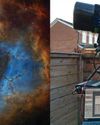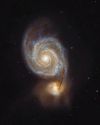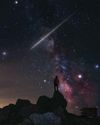
Last summer, lan Christensen was staring up at the night sky above a US National Park and International Dark Sky area. He and his companions were listening to a ranger talk about the wonders of the night sky when they were confronted with an unexpected sight: a train of dots crossing the Milky Way.
"For me it was a crystallisation," he told delegates at the Abu Dhabi Space Debate. "Here's a system with benefits... but also a direct and discernible impact on how we as a species engage with the environment."
Christensen who is the director of private sector programmes at the Secure World Foundation, an organisation that aims to promote space sustainability - was one of many speakers at the two-day meeting in December 2022, organised by the United Arab Emirates. It was the first-ever international meeting solely dedicated to addressing new space challenges on a global scale. While space has been on the agenda at major world meetings before, including the COP climate meetings, it has always been as an adjunct, a side issue among many others.
Now with rising numbers of new players in space, out-of-date rules and tensions rising both on Earth and in space, the Space Debate aimed to provide a forum to cooperatively discuss the future of space.
Safety and the sustainability of space were high on the agenda. Who owns space? Who makes the laws? Who will pay for the clean-up of space debris? These were some of the questions running through the debate.
"We have moved from the bi-polar world of the Cold War and its Space Race to a multilateral world where some 70 nations are space-capable; where a fast-growing private sector is taking an increasing role and global tensions have threatened some of the most cherished aspects of our exploration of space," said Her Excellency Sarah Al Amiri, chair of the UAE Space Agency in her opening remarks.
A problem shared
Denne historien er fra April 2023-utgaven av BBC Sky at Night Magazine.
Start din 7-dagers gratis prøveperiode på Magzter GOLD for å få tilgang til tusenvis av utvalgte premiumhistorier og 9000+ magasiner og aviser.
Allerede abonnent ? Logg på
Denne historien er fra April 2023-utgaven av BBC Sky at Night Magazine.
Start din 7-dagers gratis prøveperiode på Magzter GOLD for å få tilgang til tusenvis av utvalgte premiumhistorier og 9000+ magasiner og aviser.
Allerede abonnent? Logg på

Putting cosmic rays to work
These penetrating interstellar particles have applications from astronomy to archaeology

Set up your first imaging sequence
How to automate and coordinate your gear over multiple nights of imaging

The Universe without gravity
Life with no gravity might sound a fun idea, but as Govert Schilling explains, shutting off this pivotalforce would spell disaster for Earth and beyond

How to blend images taken with different camera setups
Combine data captured at varied focal lengths to create rich, deep images

INSIDE THE SKY AT NIGHT
Back in September 2021, The Sky at Night show spoke to Carly Howett about NASA's then upcoming Lucy mission. As the spacecraft now approaches its main targets - the Trojan asteroids - we check in with her to see how the mission is going

The science of SCI-FI
We love a good sci-fi film, but do they get the science right? Amy Arthur picks six of the big mistakes made in space films

Seeing in a new light
It's National Astronomy Week this month, so take a tip from Mark Westmoquette and let mindful stargazing change your perspective on your life and problems

What to do if you find a meteorite
Ever come across an unusual rock and wondered if it's a meteorite? Mark McIntyre explains how to tell if that stone really is a fragment from outer space

GEAR
Charlotte Daniels rounds up the latest astronomical accessories

Q&A WITH A STELLAR ECLIPSE SPECIALIST
Many stars are gravitationally locked inside multi-star systems, but a rare new triple-star system has set a new record for how cosy these clusters can get